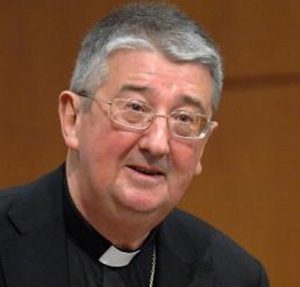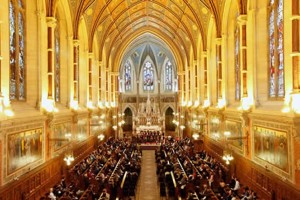
By Ann Marie Foley - 04 October, 2018

Archbishop Diarmuid Martin of Dublin
Attitudes of “aloofness and clericalism” at times have given the impression of an “authoritarian, harsh and autocratic Church” in Ireland in the past, were words highlighted by Archbishop Diarmuid Martin in recalling the World Meeting of Families.
These were among “the strongest words used” by Pope Francis during his visit to Ireland, the Archbishop recalled, saying:
“That was a call to us bishops – but also to the entire Church in Ireland – to be authentically Church in the new and changing religious culture in Ireland.”
He cautioned that change and uncertainty should not cause Catholics to “turn in on themselves, and develop a siege mentality” or rush for comfort to what is familiar.
He said that the Church’s message is one that must reach out and change men and women into people who “reflect, however imperfectly, the God of love revealed in Jesus Christ. The language and the activity of the Church must always be marked by a style that reflects that love.”
He added that in the Church today there is polarisation that excludes and divides people and “smothers true prophecy.
“The truth of Jesus Christ can only be spoken in charity. Many feel that the Church should be more vigorous in responding to the challenges that spring from a changed culture. Certainly, the Church must defend itself from unjust attack. The truth, however, does not need polemics. People’s minds and hearts will be attracted to the truth not by polemics but by the coherence between our way of life and the message of Jesus Christ,” he said.

College chapel St Patrick’s College, Maynooth
Archbishop Diarmuid Martin, Vice-President of the Bishops’ Conference, was speaking as chief celebrant at Mass at the Autumn 2018 General Meeting of the Irish Catholic Bishops’ Conference.
The celebration of the Eucharist in the College Chapel of Saint Patrick’s College, Maynooth, recognised the contribution of those involved in structures and initiatives of the Irish Episcopal Conference and in the World Meeting of Families.
The Archbishop said that those present were “a reflection of what the Church is and must be in today’s contemporary culture, where women and men, clergy and laity, the elderly and our young people, gather in prayer and in humble commitment to live the Christian life and to witness to what the joy of the Gospel means in our lives”.
He spoke of the need for repentance and said: “This process of repentance applies also to the Church. The Church must also take on the same role of being ready to witness to what humility and service mean in our world. There is no place for arrogance or triumphalism in the Christian life.”
He said that the Church must be a place where the weak, sinners, and those who are struggling feel welcome but also part of a loving community that supports and sustains them.
He asked all present to pray the Rosary in this month of October. He thanked all those who had worked for the World Meeting of Families and remembered in a special way young families like those who gathered round the Holy Father in Saint Mary’s Pro-Cathedral in Dublin.
On the last day of the Autumn 2018 General Meeting of the Irish Catholic Bishops’ Conference, all the bishops reflected on the visit of the Holy Father, Pope Francis, and on the 9th World Meeting of Families which took place in Ireland.
They stated that feedback to bishops from pilgrims who attended – from home and abroad – was that their experience was “faith-filled” and that families greatly enjoyed the WMOF celebrations, which started at local diocesan level and continued over five days at a national level.
Bishops also affirmed their “communion” with Pope Francis and said that it became clear to everyone that Pope Francis is “a pastor of deep faith, a father who personifies love, a leader who exudes hope. The faithful were inspired by his words and actions which exemplified peace, healing and goodwill.”
The bishops paid a special tribute to all involved in organising WMOF and families who acted as hosts to visiting pilgrims by providing accommodation during their time in Ireland.
They also expressed their gratitude to the civil authorities and to RTÉ in its role as host broadcaster.